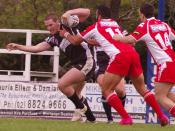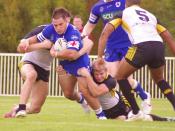Flavius Justinus was born in the Roman colony of Neapolis in Samaria around 100 AD. The Romans established Neapolis after the destruction of Jerusalem in 70 AD. As a well educated Roman citizen, Justin was schooled in classical Greek philosophy. In Dialogue with Trypho Justin explains how his search for truth in Stoicism, Aristotelianism, Pythagoreanism, and Platonism came up empty. Then one day, walking along the sea, an old man approached him.
"Does philosophy produce happiness?"ÃÂ asked the old man.
"Absolutely,"ÃÂ Justin answered, "and it alone."ÃÂ During the conversation the old man told him of ancient philosophies that came before Plato. The philosophy that the old man taught him was Christianity. The old man talked with Justin and patiently made him aware of weaknesses in Plato's thinking Justin had not seen before. He told Justin of prophets more ancient than the Greek philosophers who told the truth about God and foretold the coming of Christ.
After his conversion Justin started a school for the training of Christian philosophers in his home. Some of his pupils went on to influence the direction of Christian thought for years to come. One of his most noteworthy pupils was Tatian.
Justin used his philosophical training to defend Christianity against the attacks of the pagan world. Justin attempted to prove that the persecution that the Christians were facing was the result of ignorance to the teachings of Christianity. He eventually paid the ultimate price for his faith when he was beheaded during the reign of Marcus Aurelius in 165 AD.
Justin's Apology can be divided into three parts. First, he argues that Christians are innocent of the crimes that they had been accused of. Second, Justin tries to prove that Christianity teaches truth. In the third part, Justin gives us a picture of the early church.
In the opening chapter, we find that Justin addressed his Apology to the emperor Antoninus Pius. He appealed to the emperor for justice and liberty on the behalf of Christians.
He begins his argument by appealing to logic. He compares Christianity with the philosophy of the Greeks. Being raised in the pagan philosophies of his day, he set out to meld what he knew about the world, through worldly knowledge, to Christian thought. Some of his conclusions were valid and some were baseless. Justin held to a view that Plato and Socrates were both saved by their knowledge of the truth. Justin believed that all truth was God's truth and that God had revealed His truth through this knowledge. This knowledge was what John referred to as the Logos. He thought that any knowledge that the ancient Greeks had that was true was brought over from the earlier teachings of the Old Testament. So his appeal to philosophy is understandable.
He set out to prove that the objections of the Roman world to Christianity were unfounded. The views of the day were that the Christians were atheists because they denied the gods of the Romans. Justin stated that since the Christians worshiped the one true God that this charge was wrong. The pagans thought that the Christians were cannibals because they spoke of eating the body and drinking the blood. That is why I think that Justin wrote of the Eucharist in the later chapters. The charge that Christians were not loyal citizens because they swore allegiance to another kingdom is answered by showing that the kingdom that they serve is not of this world. Justin showed through the teachings of Jesus that Christians must be subject to the rulers of this world.
In chapter five, to counter the argument that Christians were atheists, Justin charged that the old gods were actually demons who deceived people into believing that they were deities. He goes on to say that if the choice is being called an atheist or worshiping demons, he would rather be called an atheist. But since we worship the one true God, the pagans are the true atheists.
In chapters nine and ten, Justin discusses true worship. In nine, he proves the folly of idol worship. In ten, he shows that true worship should flow out of our love for God.
The main way to judge the Christians, said Justin, is to watch the way they live their lives. Christians live knowing that God is always watching (Chapter twelve).
Their lives have been changed. Those who enjoyed fornication now live chaste lives. Those who were into sorcery, greed, and racism now have been turned completely around (Chapter fourteen). The gospel changes lives.
I was reminded of the apostle Paul on Mars Hill as I read Justin's arguments. Just as Paul used the idol to the unknown god, Justin used pagan philosophy as a springboard to preach Jesus. For his proof of the immortality of the human soul, he used their own superstitions against them. The religions of the day all held to some form of life after death. He used everything from familiar spirits to the writings of Homer.
But his best argument, I believe, is his argument for the possibility of the resurrection. He asked in chapter nineteen, "if you yourselves were not such as you now are, and born of such parents [and causes], and one were to show you human seed and a picture of a man, and were to say with confidence that from such a substance such a being could be produced, would you believe before you saw the actual production?"ÃÂ This argument alone shows the intelligence and wisdom of this man.
Starting in chapter thirty-one he sets out to show that Jesus was predicted long before in the Old Testament. He starts out with Moses' prediction of the Messiah. He shows that Jesus' birth, birthplace, and death were all shown to be fulfilled prophecies. Justin showed that he had a good knowledge of what the Old Testament taught.
I find it humorous that in his section on prophecy, that Justin thought it necessary to answer the question that would undoubtedly be raised, "If God is sovereign then is man responsible?"ÃÂ It's good to see that some arguments never die.
After discussing prophecy we have a strange interlude. He starts off in chapter fifty-four talking about the origin of heathen mythology, where once again he speaks of the influence of demons. He states that the demons, having heard that Christ was coming, created the idea of the sons of Jupiter, to confuse mankind. This way man would not believe the stories of Christ, thinking these were myths too. But the sons of Jupiter had no idea of the cross for it was hidden from them. These same demons are the ones who deceived men and caused the persecutions.
Starting in chapter sixty-one, we have a brief section on the church and the sacraments. Here we find what seems to be the beginning of the doctrine of baptismal regeneration. Justin seems to state this when he proclaims that through baptism one "may obtain in the water the remission of sins formerly committed."àBut at the same time, we do find an early Trinitarian formula. We read that baptism was done in "the name of God the Father and Lord of the universe"æand in the name of Jesus Christ "æ and in the name of the Holy Ghost."àIn his chapter on the Eucharist (Chapter sixty-six), we learn that Justin held an early form of transubstantiation. "For not as common bread and common drink do we receive these; but in like manner as Jesus Christ our Saviour, having been made flesh by the Word of God, had both flesh and blood for our salvation, so likewise have we been taught that the food which is blessed by the prayer of His word, and from which our blood and flesh by transmutation are nourished, is the flesh and blood of that Jesus who was made flesh."àThis quotation seems to indicate that he believed that the bread and wine became the actual body and blood of Christ.
Here in the final chapters we find an early reference to Sunday worship. Some of our seventh day churches teach that we were never supposed to worship on Sunday. I find it hard to believe that the church had lost which day we meet in a little over a hundred years. This is one reason that we need to study the church fathers.
Then in his conclusion he again shows his boldness when he proclaims "we forewarn you, that you shall not escape the coming judgment of God, if you continue in your injustice."ÃÂ Even with the doctrinal errors that Justin Martyr held, this document is very valuable to the church today. In it we get a picture of the early church. We get a glimpse into their persecutions and their struggle to get the truth out about their beliefs. We learn a little more about their doctrine and the way they conducted their worship. But most of all, we get know a brave man who truly earned the name Martyr.





